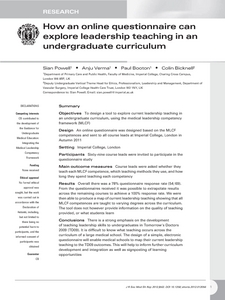Powell, S; Verma, A; Booton, P; Bicknell, C
(2012)
How an online questionnaire can explore leadership teaching in an undergraduate curriculum.
JRSM Short Reports, 3 (9).
p. 62.
ISSN 2042-5333
https://doi.org/10.1258/shorts.2012.012056
SGUL Authors: Booton, Paul
![[img]](https://openaccess.sgul.ac.uk/101473/1.hassmallThumbnailVersion/SHORTS-12-056.pdf)  Preview |
|
["document_typename_application/pdf; charset=binary" not defined]
Published Version
Download (699kB)
| Preview
|
Abstract
OBJECTIVES: To design a tool to explore current leadership teaching in an undergraduate curriculum, using the medical leadership competency framework (MLCF)
DESIGN: An online questionnaire was designed based on the MLCF competences and sent to all course leads at Imperial College, London in Autumn 2011
SETTING: Imperial College, London
PARTICIPANTS: Sixty-nine course leads were invited to participate in the questionnaire study
MAIN OUTCOME MEASURES: Course leads were asked whether they teach each MLCF competence, which teaching methods they use, and how long they spend teaching each competency
RESULTS: Overall there was a 78% questionnaire response rate (54/69). From the questionnaires received it was possible to extrapolate results across the remaining courses to achieve a 100% response rate. We were then able to produce a map of current leadership teaching showing that all MLCF competences are taught to varying degrees across the curriculum. The tool does not however provide information on the quality of teaching provided, or what students learn
CONCLUSIONS: There is a strong emphasis on the development of teaching leadership skills to undergraduates in Tomorrow's Doctors 2009 (TD09). It is difficult to know what teaching occurs across the curriculum of a large medical school. The design of a simple, electronic questionnaire will enable medical schools to map their current leadership teaching to the TD09 outcomes. This will help to inform further curriculum development and integration as well as signposting of learning opportunities.
Statistics
Item downloaded times since 28 Jun 2013.
Actions (login required)
 |
Edit Item |




